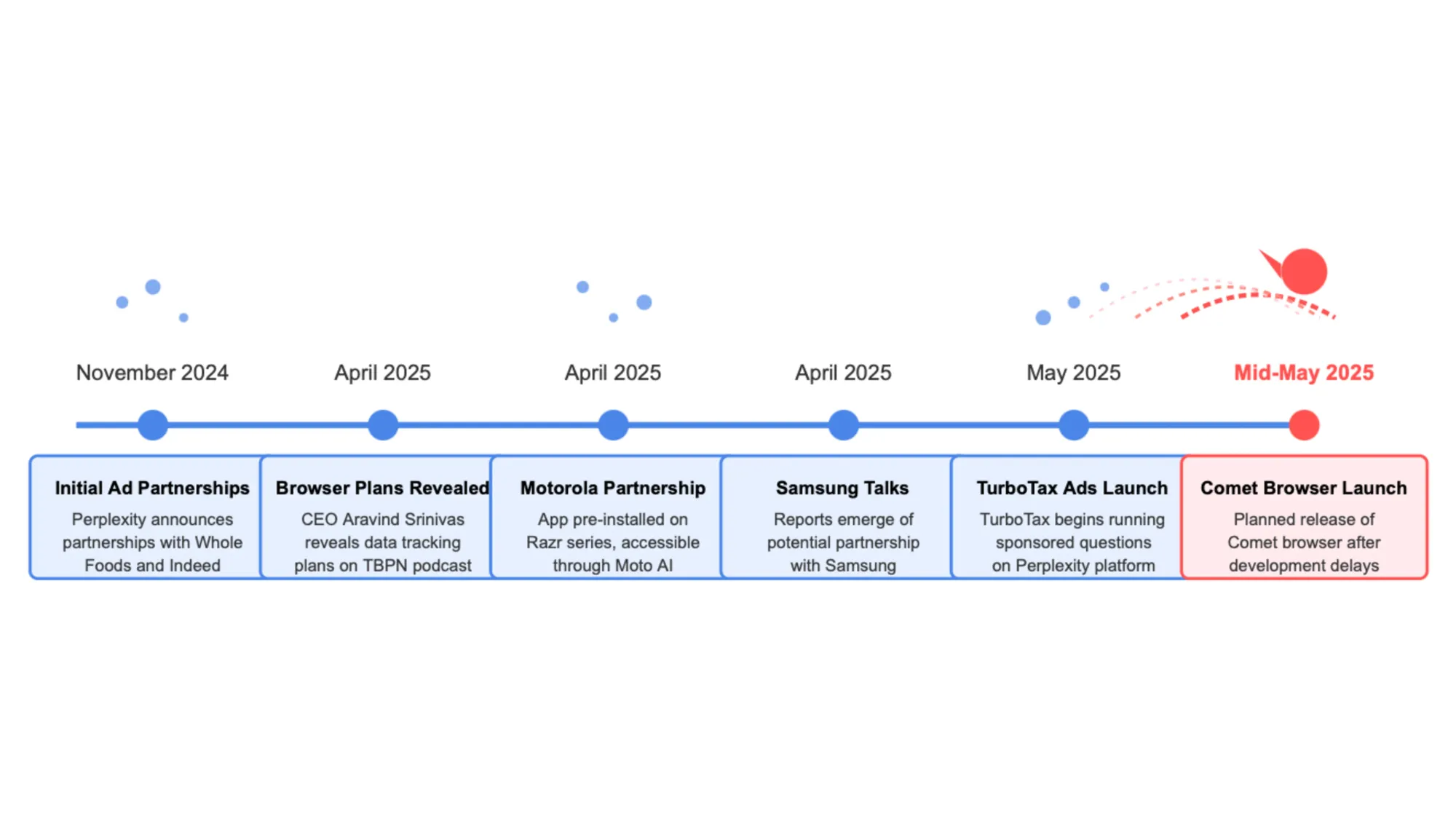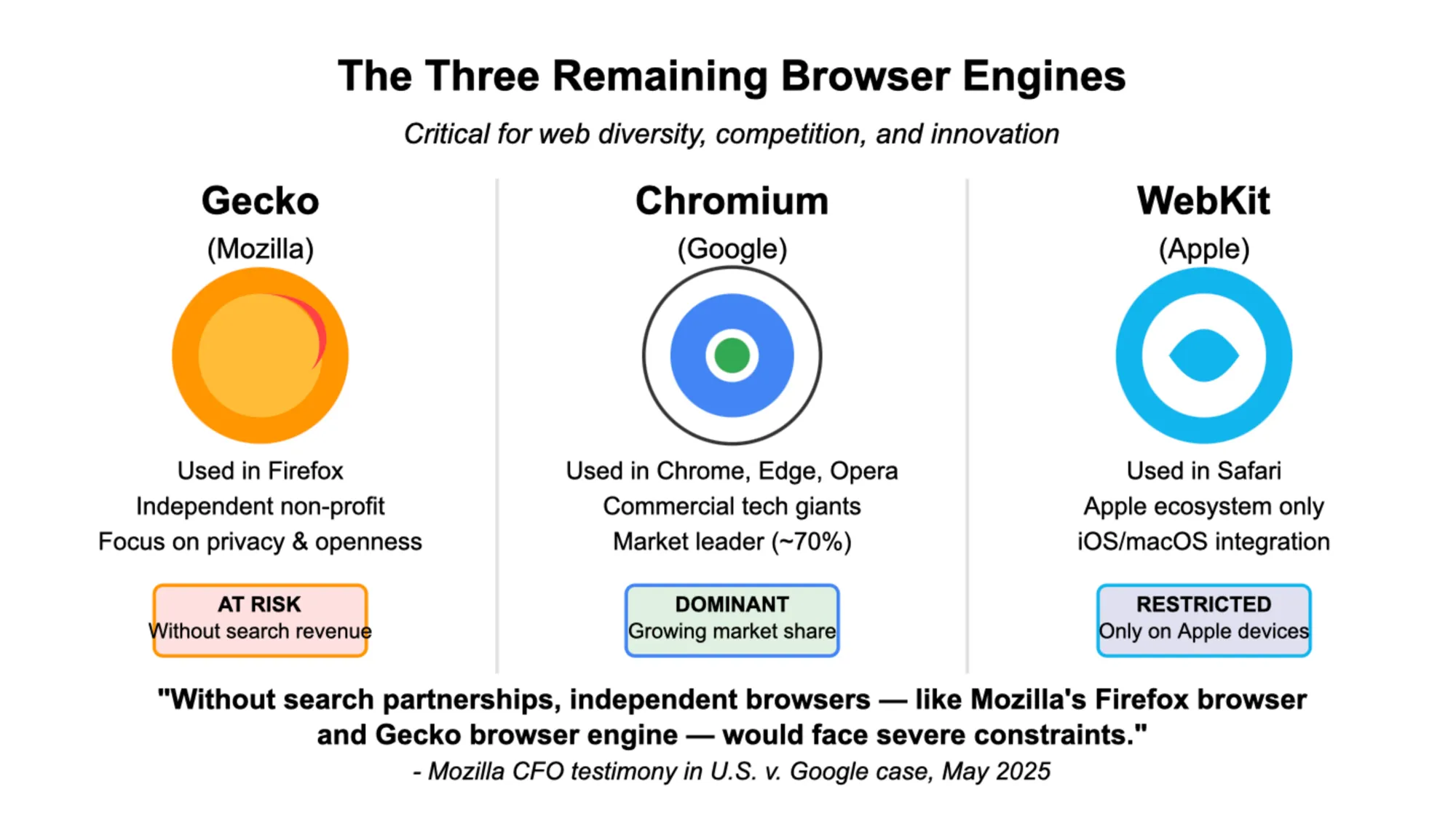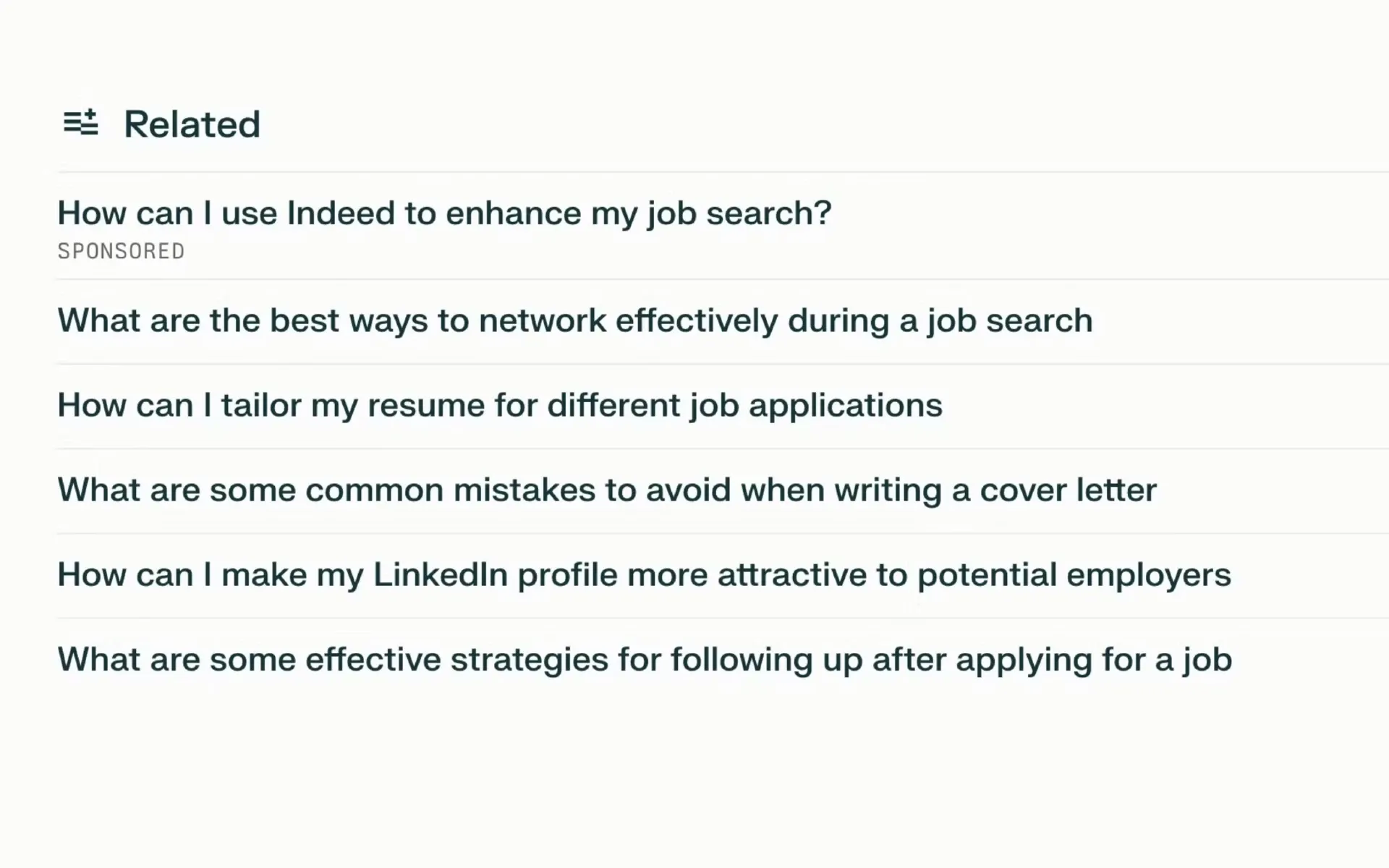Perplexity's Browser Strategy Mirrors Big Tech's Data Collection Playbook
Perplexity browser plans track user habits across web for "hyper personalized" ads like Google.

Perplexity AI has emerged as a promising challenger to Google's search dominance. However, recent revelations about the company's upcoming browser suggest that while the technology may be innovative, the business model remains firmly rooted in the data collection practices pioneered by established tech giants. As Perplexity prepares to launch its browser, named Comet, questions arise about whether AI companies are truly offering alternatives to established tech practices or simply replicating them with new technology.
Get the PPC Land newsletter ✉️ for more like this
Tracking Everything You Do: Perplexity's Browser Vision
During a candid interview on the Technology Brothers Podcast Network (TBPN) in April 2025, Perplexity CEO Aravind Srinivas revealed the company's plans to collect extensive user data through its upcoming browser.
"That's kind of one of the other reasons we wanted to build a browser, is we want to get data even outside the app to better understand you," Srinivas explained on the podcast. "Because some of the prompts that people do in these AIs is purely work-related. It's not like that's personal."

The CEO elaborated that work-related queries alone don't provide enough personal information to build accurate user profiles. "On the other hand, what are the things you're buying; which hotels are you going to; which restaurants are you going to; what are you spending time browsing, tells us so much more about you," he added.
This approach reveals a strategy strikingly similar to Google's business model, which has long relied on tracking users across the internet to build comprehensive advertising profiles. As Julie Bort reported for TechCrunch, "Perplexity doesn't just want to compete with Google, it apparently wants to be Google."
Srinivas believes users will accept such comprehensive tracking in exchange for more relevant advertising. During the podcast, he stated, "We plan to use all the context to build a better user profile and, maybe you know, through our discover feed we could show some ads there."
The revelation has already sparked criticism online. One user commented on a YouTube video of the TBPN podcast: "43:29 'We wanna get data in and outside the app' That's creepy af. I hope nobody is going to actively use the browser. Screw that!"
From AI Search to Comprehensive Ecosystem
Perplexity's entry into the browser market represents a significant expansion beyond its core AI search product. The browser, named Comet, faced development delays but is scheduled for release in May 2025, according to Srinivas.
This expansion appears to be part of a broader strategy to build a comprehensive ecosystem similar to Google's approach, which has developed products across various platforms to ensure constant data collection.
"The browser will be the first really truly different product," Srinivas said during the podcast, indicating that while other features like their assistant or apps platform were "just different versions of the same thing," the Comet browser represents a more significant departure.
Perplexity is also making inroads into the mobile space. The company has signed a partnership with Motorola, where its app will be pre-installed on the Razr series and can be accessed through Moto AI by typing "Ask Perplexity." Reports have also emerged that Perplexity is in talks with Samsung, though Srinivas didn't explicitly confirm this during the podcast.
The Monetization Strategy Takes Shape
While privacy concerns mount, Perplexity has already begun implementing its advertising strategy on its search platform. In November 2024, the company announced ad partnerships with companies including Whole Foods and Indeed, and ad agencies including PMG and Universal McCann.

More recently, TurboTax has joined the platform as an advertiser. As reported by Adweek on May 1, 2025, "Under the Sponsored Question label, TurboTax ran an ad asking, 'Can TurboTax handle investment income?' Another ad simply read 'TurboTax Personal,' which, when clicked, surfaced a page highlighting key features of the product. A third, 'TurboTax help with Roth IRA limits,' directed users to a result explaining how the service can determine whether a user's Roth IRA contribution exceeds IRS limits based on their income."
Glenn Gabe, an SEO consultant, highlighted these developments on social media, noting: "Ads on Perplexity -> TurboTax Quietly Starts Advertising on Perplexity." He later added context about the scale of Perplexity's operations, writing: "230M queries per month globally. That's compared to 417B per month on Google."
According to information obtained by Adweek, "Perplexity processes more than 230 million queries per month globally and is building its ad business around 15 core categories, including finance, health, tech, and entertainment. The company is offering category exclusivity through a CPM model with minimum spend guarantees, with CPMs expected to top $50."
Despite the push into advertising, Perplexity has maintained that "brand dollars won't influence its AI-generated answers," according to Adweek. The company sees advertising as a scalable revenue stream, citing the limitations of a subscription-only model.
The Challenges of Building a Browser in Today's Market
Building a browser from scratch is no small undertaking, particularly in a market dominated by established players like Google Chrome, Apple Safari, and Microsoft Edge. When asked about the development timeline for Comet during the TBPN podcast, Srinivas acknowledged delays.
"It was supposed to be out by now. We got delayed... partly because we underestimated difficulty of the project and partly because we tried to do multiple things," he explained. The CEO added that they've since scoped down the project and are "aiming to get it out by mid-May."
This timeline challenge illustrates the ambitious nature of Perplexity's expansion plans. The company is not merely looking to provide an alternative search experience but is positioning itself as a comprehensive platform with multiple touchpoints across users' digital lives.
The Broader Landscape of Online Tracking
Perplexity's approach to data collection doesn't exist in isolation. Various tech giants employ similar strategies, creating an ecosystem where user privacy is consistently compromised in exchange for "free" services.
As Julie Bort pointed out in her TechCrunch article, "Google isn't the only one watching users online to sell ads. Meta's ad tracking technology, Pixels, which is embedded on websites across the internet, is how Meta gathers data, even on people that don't have Facebook or Instagram accounts. Even Apple, which has marketed itself as a privacy protector, can't resist tracking users' locations to sell advertising in some of its apps by default."
These practices have contributed to growing distrust of technology companies among consumers and regulators globally. "This kind of thing has led people across the political spectrum in the U.S. and in Europe to distrust big tech," Bort noted.
The timing of Srinivas's comments is particularly notable given the ongoing antitrust case against Google. The U.S. Department of Justice has alleged Google behaved in monopolistic ways to dominate search and online advertising and wants the judge to order Google to divest Chrome.
Interestingly, both OpenAI and Perplexity have expressed interest in acquiring Chrome if Google is forced to sell it. This suggests that despite concerns about big tech's data collection practices, emerging AI companies see value in acquiring established browsing platforms with large user bases.
The Economics of AI and Data Collection
The economic realities of building sustainable business models in the AI era appear to be pushing companies like Perplexity toward data collection strategies similar to those employed by established tech giants.
During the TBPN podcast, Srinivas touched on the challenges of monetization in the AI space. When asked about shopping capabilities within Perplexity, he explained their attempts to integrate direct purchasing into their platform: "We thought this would be the best innovator dilemma angle against Google because Google... even if Gemini gives you shopping answers, they have no incentive to like let you transact... because they make money by sending you to merchant sites."
However, Perplexity discovered that user experience and result quality were more important than transaction capabilities. "What we learned the hard way is people actually want really good results first—that's why they're even coming here. They don't care if they transact here or not, it's a secondary thing," Srinivas admitted.
This insight reveals the complex landscape AI companies must navigate. While they may aspire to differentiate themselves from established tech giants, the economic pressures of building and scaling AI products often lead them toward similar business models centered around data collection and targeted advertising.
Growing Rapidly: Funding and Valuation
As Perplexity continues to expand its offerings and user base, the company's valuation has skyrocketed. According to reports from Adweek, "the startup is looking to raise between $500 million and $1 billion in funding, which could value the company at $18 billion."
This potential valuation underscores the significant investor interest in AI search companies, despite the nascent state of their monetization strategies. It also highlights the perceived value of data collection capabilities in today's tech landscape.
The Future of Privacy in AI Search
As AI search companies like Perplexity attempt to challenge Google's dominance, a critical question emerges: Will these new entrants prioritize user privacy, or will they simply replicate the data collection practices that have made Google successful?
Based on Srinivas's comments, it appears that Perplexity is leaning toward the latter approach. By building a browser designed to track users' activities across the internet, the company seems to be following Google's playbook rather than charting a fundamentally different course.
This raises broader questions about the future of privacy in the AI era. As AI companies seek to monetize their technologies, will user data inevitably become the primary currency? Or can alternative business models emerge that prioritize privacy while still enabling companies to build sustainable businesses?
The answer to these questions will shape not only the competitive landscape of AI search but also the future relationship between users and technology companies. As Perplexity prepares to launch Comet, users will need to decide whether the benefits of AI-powered search outweigh the privacy implications of comprehensive tracking.
A Growing Trend Among AI Companies
Perplexity isn't alone in its transition from pure AI innovation to more traditional tech business models. Other AI companies are also exploring various monetization strategies that often involve some form of data collection or advertising.
This trend suggests that despite the transformative potential of AI technology, the economic realities of building sustainable businesses may be pushing companies toward familiar revenue models. The challenge for users and regulators will be to determine where to draw the line between reasonable data collection for service improvement and invasive tracking for advertising purposes.
Timeline of Perplexity's Expansion
Perplexity's journey from AI search startup to aspiring tech ecosystem illustrates the rapid evolution occurring in the AI space:
- November 2024: Perplexity announces initial ad partnerships with companies including Whole Foods and Indeed
- April 2025: Perplexity CEO Aravind Srinivas reveals browser tracking plans on TBPN podcast
- April 2025: Partnership announced with Motorola to pre-install app on Razr series
- April 2025: Reports emerge of potential partnership with Samsung
- May 2025: TurboTax begins advertising on Perplexity platform
- May 2025: Planned launch of Comet browser following development delays
The Privacy Paradox Continues
As Perplexity continues its expansion beyond its core AI search product, the tech community will be watching closely to see how it balances innovation with privacy considerations. The company's approach to browser development and data collection represents a crucial test case for how AI companies will navigate privacy concerns in an increasingly scrutinized digital landscape.
The irony is not lost on industry observers: companies that emerged to challenge established tech giants are now adopting many of the same practices that have drawn criticism of those giants. Whether this represents a necessary compromise for business sustainability or a missed opportunity to establish new paradigms for user privacy remains to be seen.
What is clear is that as AI technology becomes increasingly integrated into our digital lives, the questions surrounding data collection, privacy, and business models will only become more pressing. Users, regulators, and companies will all need to grapple with these complex issues as we collectively shape the future of technology.
For Perplexity and other AI companies, the challenge will be to demonstrate that their technologies offer genuine improvements over existing solutions—not just in terms of capability, but also in terms of respect for user privacy and data sovereignty. As Comet prepares for launch, the browser may well become a litmus test for these broader industry trends.



